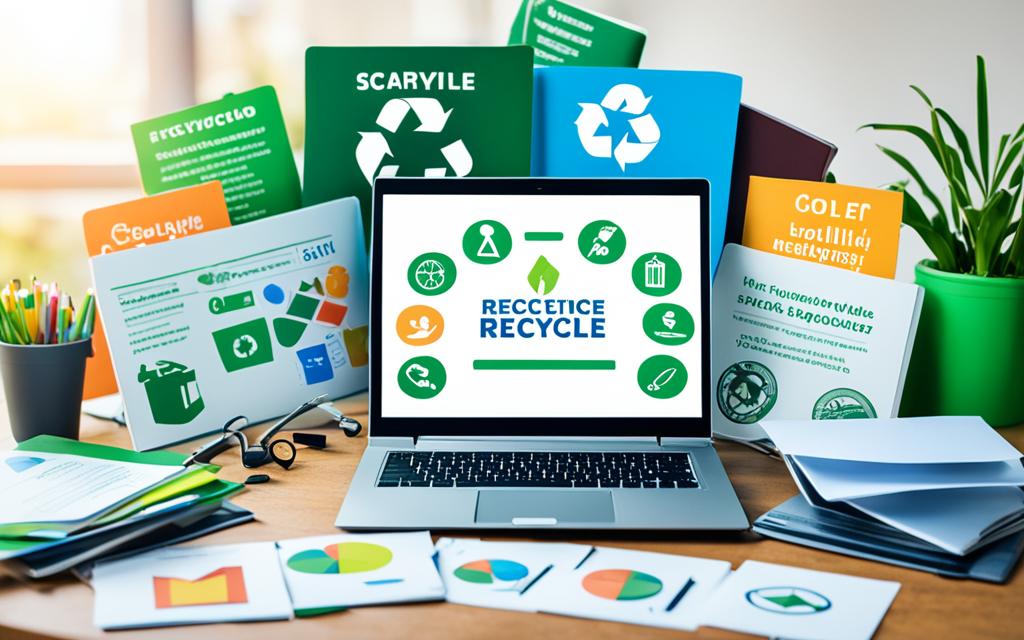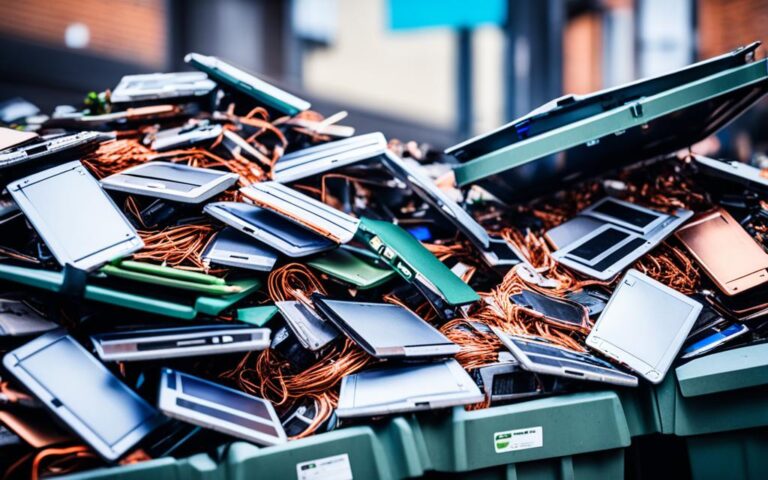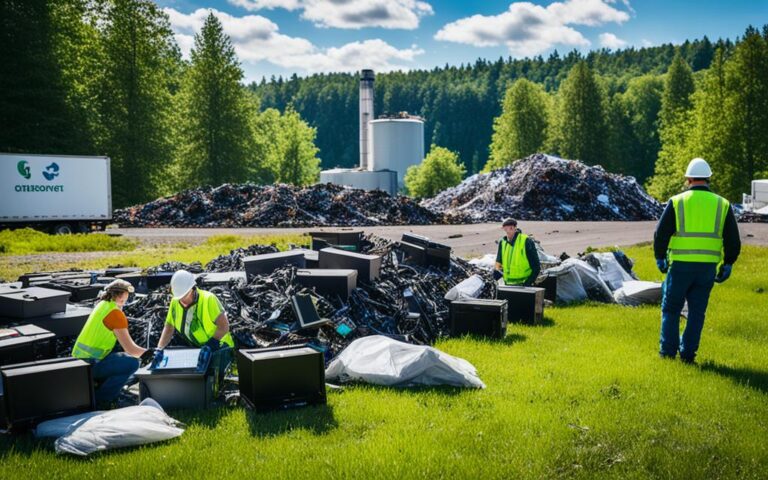The Role of Education in Promoting Laptop Recycling Awareness
Education plays a vital role in promoting laptop recycling awareness and fostering sustainability while reducing electronic waste in the UK. In educational institutions such as schools, colleges, and universities, the generation of old and redundant IT equipment can contribute to electronic waste if not properly managed. It is essential for these institutions to implement strategies for managing the technology lifecycle in a cost-effective and environmentally conscious manner.
This includes data destruction services to ensure the safe disposal of sensitive information, electronic refurbishing to extend the lifespan of equipment, remarketing of refurbished devices, and responsible recycling and disposal of IT equipment. By educating students about the importance of recycling and organizing seminars and events on recycling, educational institutions can spread awareness and encourage students to adopt sustainable practices both at school and in their personal lives.
Efficient IT recycling and disposal services, provided by professional companies like Computer IT Disposals, can help educational institutions leave a positive impact on the environment while benefiting from asset value recovery and reduced costs.
The Environmental Impact of Laptop Recycling in Schools
Laptop recycling in schools has a significant environmental impact. By properly managing and recycling old IT equipment, schools can prevent these devices from ending up in landfills, where they can contribute to pollution and the release of toxic chemicals. Recycling IT equipment helps to conserve valuable resources by reducing the need for new materials and the energy required to produce them. It also plays a role in reducing greenhouse gas emissions associated with the production of new devices.
By educating students about the importance of recycling and waste reduction, schools can instill environmentally conscious habits and encourage students to apply these practices in their everyday lives. Promoting laptop recycling awareness in schools not only benefits the environment but also helps students develop a sense of responsibility and a commitment to sustainability.
Recycling IT equipment helps to conserve valuable resources by reducing the need for new materials and the energy required to produce them.
When schools implement laptop recycling programs, they not only reduce the environmental impact of electronic waste but also set an example for their students. Students become more aware of the consequences of their actions and learn the importance of responsible waste management. They develop a deeper understanding of how their own behaviors impact the planet and are more likely to make conscious choices that contribute to waste reduction and sustainability.
The Role of Education in Laptop Recycling
Education plays a crucial role in promoting laptop recycling in schools. By incorporating environmental education into the curriculum, students gain a comprehensive understanding of the environmental impact of electronic waste and the benefits of recycling. Teachers can integrate lessons on waste reduction, recycling, and the proper disposal of electronic devices into various subjects, making it a cross-disciplinary effort.
Furthermore, organizing events and seminars focused on recycling and waste reduction can create a platform for students to actively engage in sustainable practices. Schools can invite recycling experts and local organizations to share their knowledge and experiences, providing students with valuable insights and inspiring them to take action. By involving students in interactive activities, such as recycling competitions or waste audits, schools can foster a culture of environmental responsibility.
Laptop recycling in schools not only addresses the immediate need for responsible waste management but also develops a generation of environmentally conscious citizens. By raising awareness, providing educational resources, and actively involving students, schools are creating a sustainable future for both the environment and the community.
Waste Management Challenges in Educational Institutions
Effective waste management in educational institutions faces several challenges. Limited staff time and resources pose barriers to implementing sustainable waste reduction initiatives. Teachers and staff juggle numerous responsibilities, making it difficult to allocate sufficient time and effort towards waste management practices. Additionally, awareness among students, teachers, and staff about the significance of waste management and recycling may be lacking, leading to a lack of full participation and cooperation. Insufficient funding further compounds these challenges, as schools struggle to invest in the necessary infrastructure, resources, and educational programs to address waste management effectively.
To overcome these complications, a comprehensive approach is required. It involves implementing adequate training and awareness programs for staff and students, ensuring the provision of sufficient funding for waste management initiatives, and adopting practical recycling strategies.
“Effective waste management in educational institutions requires a holistic approach that encompasses education, funding, and practical strategies.”
By providing training and awareness programs for staff and students, educational institutions can enhance understanding and promote a culture of waste reduction and recycling. These initiatives can help individuals recognize the importance of waste management and inspire them to take action in their daily lives.
Furthermore, securing adequate funding is crucial to support waste management initiatives. Financial resources enable schools to invest in the necessary infrastructure, such as recycling bins, waste segregation systems, and recycling facilities. Additionally, funding allows for the implementation of educational programs that raise awareness and educate students about waste management practices and their environmental impact.
Implementing practical recycling strategies is another essential aspect of effective waste management. This includes establishing recycling systems, ensuring the availability of recycling bins in prominent locations throughout the institution, and simplifying waste sorting procedures. By making recycling accessible and user-friendly, educational institutions can encourage widespread participation and cooperation.
Addressing the waste management challenges in educational institutions requires a collaborative effort involving school administrators, teachers, students, and relevant stakeholders. By overcoming these challenges, educational institutions can develop sustainable waste management practices and foster environmentally conscious communities.
Strategies for Effective Waste Management in Educational Institutions
To achieve effective waste management in educational institutions, several strategies can be implemented. It is crucial to promote waste segregation by providing separate recycling bins for different waste categories in classrooms and throughout the school premises. Clearly labeling and making these bins easily accessible can encourage students to dispose of their waste correctly.
Additionally, setting up a composting scheme for food waste generated in school canteens can serve as both an educational tool and a practical way to reduce waste. Composting allows students to witness direct waste recovery and learn about the importance of organic waste management.
Educating staff and students about proper waste management practices through training sessions and awareness campaigns can help create a culture of waste reduction and recycling. By implementing these strategies, educational institutions can foster a more sustainable environment and instill responsible waste management habits in students.
| Strategies for Effective Waste Management | Benefits |
|---|---|
| Waste Segregation | – Proper disposal of different waste categories – Reduction of contamination in the recyclables – Simplifies the recycling process |
| Composting | – Organic waste reduction – Valuable resource for gardening – Promotes environmental awareness |
| Educational Programs | – Cultivates responsible waste management habits – Fosters a sustainable mindset – Engages students in environmental conservation |
By implementing these strategies, educational institutions can contribute to environmental sustainability, reduce waste, and educate future generations on the importance of responsible waste management.
Conclusion
Education plays a critical role in promoting laptop recycling education and fostering sustainability in the UK. By incorporating recycling initiatives, waste segregation, and composting schemes into their operations, educational institutions can effectively manage their waste and reduce their environmental footprint. Teaching students about the importance of recycling and waste reduction at an early age instills lifelong habits of environmental responsibility. Additionally, promoting responsible waste management practices in educational institutions can create a positive school image and inspire students and parents to adopt sustainable practices in other aspects of their lives. By working together to raise awareness and implement effective waste management strategies, educational institutions can contribute to a more sustainable future and reduce the amount of electronic waste generated in the UK.
FAQ
How does education promote laptop recycling awareness?
Education plays a vital role in promoting laptop recycling awareness by educating students about the importance of recycling and organizing seminars and events on recycling. This helps spread awareness and encourages students to adopt sustainable practices both at school and in their personal lives.
What is the environmental impact of laptop recycling in schools?
Properly managing and recycling old IT equipment in schools prevents these devices from ending up in landfills, where they can contribute to pollution and the release of toxic chemicals. Recycling IT equipment also helps to conserve resources, reduce the need for new materials, and minimize the greenhouse gas emissions associated with the production of new devices.
What are the challenges of waste management in educational institutions?
Waste management in educational institutions can present various challenges, including limited staff time and resources, lack of awareness among students and staff, and insufficient funding for waste management initiatives. Overcoming these challenges requires a comprehensive approach that includes training, awareness programs, and practical recycling strategies.
What strategies can be implemented for effective waste management in educational institutions?
To achieve effective waste management, educational institutions can implement strategies such as promoting waste segregation through separate recycling bins, setting up composting schemes for food waste, and educating staff and students about proper waste management practices through training sessions and awareness campaigns.
How does education contribute to sustainability and waste management in the UK?
Education plays a critical role in promoting laptop recycling awareness and fostering sustainability in the UK. By incorporating recycling initiatives, waste segregation, and composting schemes into their operations, educational institutions can effectively manage their waste and reduce their environmental footprint. Teaching students about the importance of recycling and waste reduction at an early age instills lifelong habits of environmental responsibility.















